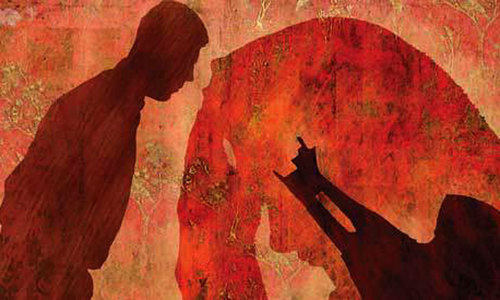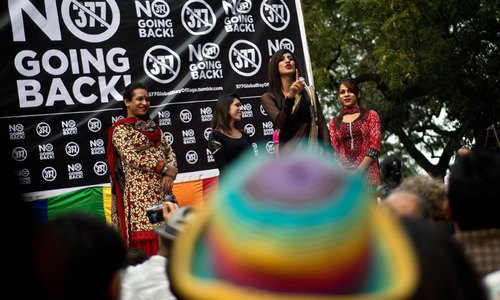Indian Supreme Court decriminalises homosexuality in landmark verdict

The Indian Supreme Court (SC) on Thursday in a landmark judgement legalised consensual sexual relations between adults of the same gender, partially striking down a British-era law that criminalised homosexuality.

A five-judge SC Constitution bench led by Chief Justice of India (CJI) Dipak Misra and comprising Justices Rohinton F. Nariman, A.M. Khanwilkar, D.Y. Chandrachud and Indu Malhotra delivered its unanimous verdict in four separate opinions, Indian media reported.
In the combined judgement, CJI Misra and Justice Khanwilkar said that the law would not apply to consensual same sex acts between homosexuals, heterosexuals, lesbians and other sexual minorities, but would apply to bestiality and non-consensual sexual acts, The Hindu reported.
Homosexuality was criminalised in India under Section 377 of the Indian Penal Code ─ a relic enacted by British rulers in 1861, which had described same sex acts as "carnal intercourse against the order of nature" and allowed for jail terms of up to 10 years, although prosecutions remained rare.
Section 377: Unnatural offences: Whoever voluntarily has carnal intercourse against the order of nature with any man, woman or animal shall be punished with imprisonment for life, or with imprisonment of either description for a term which may extend to 10 years, and shall also be liable to fine.
Activists had been fighting the ban since the 1990s, suffering several court reverses before Thursday's verdict which sparked celebrations among lesbian, gay, bisexual and transgender groups (LGBT) across India.

In 2009 the Delhi High Court effectively decriminalised homosexuality, saying a ban violated fundamental rights, but the Supreme Court reinstated it in 2013 after religious groups successfully appealed, saying that the high court had overstepped its authority and that the responsibility for changing the law rested with lawmakers not the courts. Efforts to introduce legislation, however, came to nothing.
But in January this year, the Supreme Court agreed to hear a challenge by a clutch of high-profile Indians who said the law created an atmosphere of fear and intimidation in the world's largest democracy.
CJI Misra, while reading out the judgement, said: "Any consensual sexual relationship between two consenting adults ─ homosexuals, heterosexuals or lesbians ─ cannot be said to be unconstitutional," India Today reported.
Justice Nariman pointed out that India's Mental Healthcare Act had recognised that homosexuality is not a mental disorder and ordered the government to work towards eradicating the stigma surrounding sexual minorities, The Hindu report added.
Justice Indu Malhotra said that history in her opinion owes the LGBT community an apology for discrimination and ostracism, while Justice D.Y. Chandrachud said he believes that the LGBT community is entitled to equal citizenship and equal rights under the Constitution, India Today reported.

Justice Chandrachud, according to The Hindu, questioned the meaning of the phrase "order of nature" in Section 377 and said: "[The] State cannot decide the boundaries between what is permissible or not. Section 377 is based on deep-rooted gender stereotypes. It persecutes people. It is a majoritarian impulse to subjugate a sexual minority to live in silence," adding that decriminalisation of homosexuality is only the first step.
The judgement also pronounced discrimination on the basis of sexual orientation a violation of freedom of expression, the India Today report said.
"Sexual orientation of an individual is natural and discrimination on the basis of sexual orientation is a violation of Freedom of Expression," the court said.
CJI Mishra observed: "No one can escape from their individualism. Society is now better for individualism," according to the India Today report. "I am what I am. So take me as I am. No one can escape from their individuality."

Members of the LGBT community hugged each other and cried as news of the verdict spread.
"I am speechless! It's taken a long time to come but finally I can say I am free and I have equal rights as others," said Rama Vij, a college student who wore a rainbow scarf.
"Today is a day of gay pride, a day of celebration, a day when respect and dignity was finally restored in India for lesbian, gay, bisexual, transgender and intersex people," said Michel Sidib, executive director of UN AIDS.
"I applaud the brave activists, civil society organisations and community groups that have fought long and hard for this injustice to be reversed."
Same sex relations have long been taboo in India ─ particularly in rural areas where homophobia is widespread.
"It was a law that propagated homophobia," said Keshav Suri, one of the petitioners against Section 377, who organised a Bollywood-style dance show at his family's luxury Delhi hotel to celebrate the court victory.
"In rural areas it is a harassment tool, used by cops, used by authorities for extortion," Suri told AFP in an interview ahead of the verdict.
Many Indian gay professionals have moved to Canada and Europe where they are more accepted, added the businessman who married his partner in Paris this year.
India is now one of more than 120 countries to have effectively decriminalised homosexuality.
While the court ruling only legalises sexual acts between adults, gay activists have hailed the verdict as a major boost as religious groups have fiercely opposed any liberalisation of sexual morality.
India's conservative government had opposed ending Section 377 but said ahead of the hearing that it would leave the decision to the "wisdom" of the Supreme Court.
It had warned, however, that judges should not change other aspects of Indian law, such as the right to marriage.













































